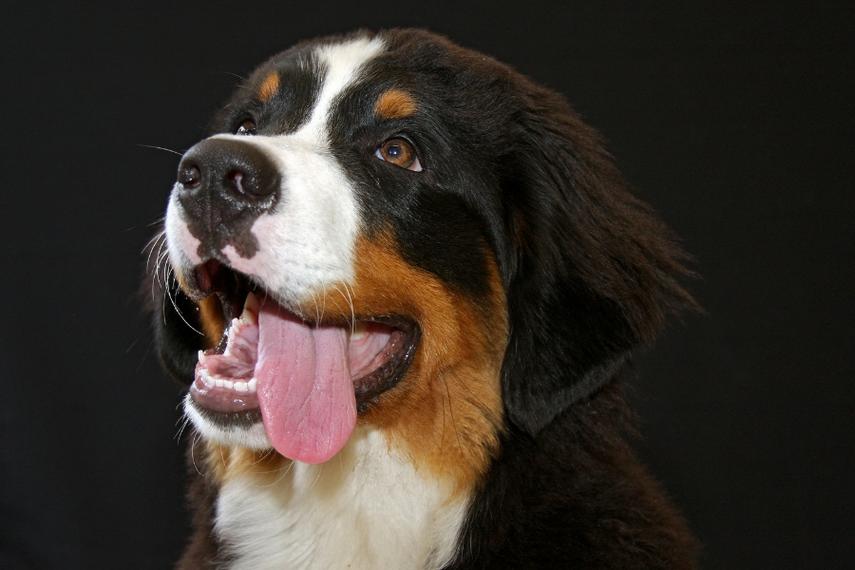Welcome to our comprehensive guide on the Bernese Mountain Dog breed. This is your one-stop resource for everything you need to know about this majestic breed, from its rich history to its unique temperament, and everything in between.
- Bernese Mountain Dogs – All About the Bernese Mountain Dog Breed
You’ll find detailed information on the Bernese Mountain Dog’s physical characteristics and health, as well as expert advice on care and training. We’ve also included a trove of high-quality photos to give you a vivid picture of what to expect from these beautiful creatures.
We delve into the Bernese Mountain Dog’s history, dating back to their origins in Switzerland, and their journey to becoming one of the most beloved breeds worldwide. This guide also features in-depth articles about the breed’s temperament, displaying their calm, confident, and friendly nature. Their lifespan, which typically spans 6-8 years, and pricing for puppies are also discussed in detail. You’ll also find enlightening facts about the breed that are sure to surprise and intrigue you.
The guide also includes a section dedicated to the health and care of the Bernese Mountain Dog. This will cover their dietary needs, exercise requirements, and potential health issues. And for those thinking about bringing a Bernese Mountain Dog into their home, we’ve compiled a list of puppy and dog names that suit this breed perfectly. It’s not just a guide, but a celebration of the Bernese Mountain Dog breed, and we hope that it will answer all your questions and more.
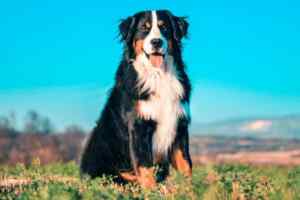
The History and Origin of Bernese Mountain Dogs
Bernese Mountain Dogs, originally known as Berner Sennenhund in its native Switzerland, are large-sized working dogs that have become popular for their temperament and intelligence. The breed has an interesting history, dating back to the Roman Empire’s invasion of Switzerland more than 2,000 years ago.
Origins
The Bernese Mountain Dog’s ancestors were Mastiff-type dogs that the Romans brought with them during their invasion of Switzerland. These dogs were then crossbred with local Swiss dogs to create sturdy, robust canines capable of working in the rugged Alpine terrain. They were primarily used for herding cattle, pulling carts, and serving as all-purpose farm dogs.
The name “Bernese Mountain Dog” comes from the Canton of Bern in Switzerland, where the breed was most prevalent. These dogs were an integral part of farm life in the region, known for their strength, agility, and versatility.
Development and Recognition
Despite their long history, the Bernese Mountain Dogs nearly went extinct in the late 19th century, due to industrialization and the decline of small farms where these dogs were commonly used. However, efforts by Swiss cynologist Professor Albert Heim and other dog enthusiasts saved the breed from extinction. They collected sturdy examples of the breed from the remaining farm dogs in the Swiss Alps, and began a selective breeding program.
The breed was officially recognized by the Swiss Kennel Club in 1907, following the establishment of the Swiss Club for Bernese Mountain Dogs in 1904. The American Kennel Club (AKC) recognized the Bernese Mountain Dog as a breed in 1937.
Modern Bernese Mountain Dogs
Today, Bernese Mountain Dogs are known for their friendly and calm nature, making them excellent family pets. They are still used as working dogs in some areas, especially in Switzerland, but they are primarily kept as companion animals.
They are large, sturdy dogs, with males weighing between 80-115 pounds, and females between 70-95 pounds. They have a distinctive tri-colored coat, which is thick and moderately long, requiring regular grooming. Their life expectancy is relatively short compared to other breeds, generally around 7-10 years, often due to health issues common in large breeds such as hip and elbow dysplasia, and certain types of cancer.
Breeding programs have aimed to improve the health and longevity of the breed, and they remain a popular choice for families due to their gentle, good-natured temperament. Despite their size, they are known to be good with children and other pets, and they are often described as gentle giants.
In conclusion, the Bernese Mountain Dog has a rich history that spans over two millennia. From their origins as a working farm dog in the Swiss Alps to their popularity as a family pet today, they are a breed that has endured and adapted to changing times. Their friendly and loyal nature, combined with their striking appearance, ensures their continued popularity.
Bernese Mountain Dog Appearance
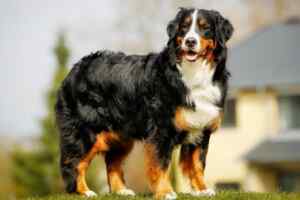
The Bernese Mountain Dog, also known as Berner Sennenhund in its native Swiss, is a large, beautiful breed known for its striking tricolor coat and sturdy build. They are a member of the working group of dogs and were originally bred for herding cattle, pulling carts, and serving as watchdogs.
Size: Bernese Mountain Dogs are large and powerful, with males typically standing between 25-27.5 inches tall at the shoulder and females standing 23-26 inches. In terms of weight, males often weigh between 80-115 pounds, while females typically weigh between 70-95 pounds.
Coat: The coat of a Bernese Mountain Dog is perhaps its most distinctive feature. It’s thick, moderately long and slightly wavy or straight, providing insulation from the cold. The coat is tricolor, with jet black as the main color, and vivid rust and bright white accents. The chest, feet, tail tip, and a blaze on the head are typically white, and rust is commonly found on the cheeks, sides of the chest, under the tail, and on each leg.
Head: The head of a Bernese Mountain Dog is flat on the top and broad, with a moderate stop. The medium-sized ears are set high, triangular in shape, gently rounded at the tips, and hang close to the head when in repose. The eyes are dark brown and have a gentle and intelligent expression.
Body: The Bernese Mountain Dog has a sturdy and robust body, which is slightly longer than it is tall. The chest is broad and deep, reaching down to the elbows. They have a wide, strong back and a muscular, broad loin. The tail is bushy, carried low when the dog is relaxed.
Legs and Feet: The Bernese Mountain Dog has strong, straight legs with a good bone structure. The thighs are broad and muscular. The feet are round and compact with well-arched toes.
Despite their large size, Bernese Mountain Dogs are known for their agility and hardiness, traits that were necessary for their work on Swiss farms. Their appearance is a perfect combination of strength, elegance, and balance. They are also known for their friendly and gentle disposition, making them great family pets.
Temperament and Personality of Bernese Mountain Dogs
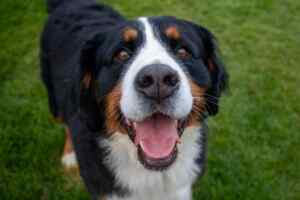
The Bernese Mountain Dog breed is known for it’s temperament and personality which makes it a beloved breed among dog lovers.
Temperament:
1. Affectionate: Bernese Mountain Dogs are known for their sweet and gentle nature. They are extremely affectionate and love to be around their owners. They are also good with children and other pets, making them an ideal family dog.
2. Loyal: Bernese Mountain Dogs are incredibly loyal to their families. They thrive in environments where they can spend a lot of time with their owners. They are known to be protective of their families and are always ready to defend them if needed.
3. Intelligent: Bernese Mountain Dogs are highly intelligent. They have a high learning capacity and respond well to training. They love mental stimulation and enjoy tasks that challenge them mentally.
4. Calm and Patient: Despite their large size, Bernese Mountain Dogs are known for their calm and patient demeanor. They are not easily agitated and are tolerant, which makes them great companions in households with children.
5. Hardworking: These dogs are known for their working heritage. They have a strong drive to work and are often used in tasks like pulling carts or herding livestock. This makes them happy and fulfilled.
Personality:
1. Playful: Bernese Mountain Dogs have a playful side. They enjoy playing games and running around in open spaces.
2. Social: They are sociable dogs who enjoy being around people. They are not known for being aggressive and generally get along well with other dogs and pets.
3. Sensitive: Bernese Mountain Dogs are known to be sensitive and may not respond well to harsh training methods. They need a gentle hand and lots of positive reinforcement.
4. Adaptable: Although they are large dogs that require regular exercise, they can adapt to various living situations. They can live in apartments provided they are given enough exercise and mental stimulation.
5. Alert: Bernese Mountain Dogs are alert and aware of their surroundings. They make excellent watchdogs as they will alert their owners to any unusual activity.
Bernese Mountain Dog Training
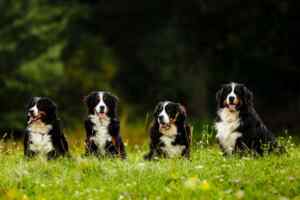
Bernese Mountain Dog Training involves several aspects, from basic obedience training to more specific techniques that help these dogs become well-behaved and disciplined.
1. Puppy Training: This is the first step in training a Bernese Mountain Dog. It includes house training, leash training, and basic commands like sit, stay, and come. Socialization is also crucial during this stage to familiarize the puppy with different environments, people, and animals.
2. Obedience Training: This involves teaching the dog to obey commands and behave well. Bernese Mountain Dogs are intelligent and eager to please, making them relatively easy to train. However, their size and strength require them to be well disciplined.
3. Agility Training: Bernese Mountain Dogs are large and strong, and they can benefit from agility training. This involves navigating through obstacle courses, which promotes physical fitness, mental stimulation, and obedience.
4. Advanced Training: This could include training for shows, therapy work, or even search and rescue missions. Bernese Mountain Dogs are versatile and can excel in many areas with the right training.
5. Behavior Correction: This involves correcting unwanted behaviors like excessive barking, digging, or chewing. Positive reinforcement techniques are often used, rewarding the dog for good behavior rather than punishing them for bad behavior.
6. Socialization Training: Bernese Mountain Dogs are usually good-natured and sociable. However, it’s essential to expose them to various situations, people, and other animals to ensure they react appropriately.
7. Health and Fitness Training: This involves activities that keep the dog physically fit and mentally stimulated. Regular exercise is essential for this breed to prevent obesity and related health problems.
8. Crate Training: This can be useful for house training and provides the dog with a safe and comfortable space of their own.
Training a Bernese Mountain Dog requires patience, consistency, and a lot of love. It’s essential to start training early and to make it a regular part of your dog’s routine. With the right approach, your Bernese Mountain Dog can become a well-behaved and loyal companion.
Caring For Your Bernese Mountain Dog
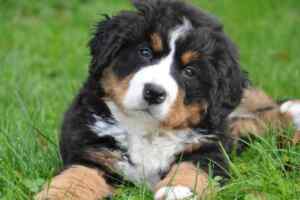
The Lifespan of a Bernese Mountain Dog: Ensuring a Long and Healthy Life
The Bernese Mountain Dog is a large, friendly breed, known for its distinctive tri-color coat and gentle, affectionate nature. These dogs make excellent companions and are well-suited to families with children, but potential owners should be aware of the breed’s relatively short average lifespan, which is typically around 7-10 years. However, there are ways to ensure your Bernese Mountain Dog leads a long and healthy life.
1. Proper Nutrition: The first step to ensuring a long and healthy life for a Bernese Mountain Dog is to provide them with a balanced and nutritious diet. A diet high in protein, supplemented with fruits, vegetables, and whole grains can help keep your dog healthy and active.
2. Regular Exercise: Bernese Mountain Dogs are active and playful, requiring regular exercise to maintain a healthy weight and cardiovascular health. Regular walks, playtime, and social interaction can greatly improve their quality of life.
3. Regular Vet Check-ups: Regular vet check-ups are essential in detecting any potential health issues early. Bernese Mountain Dogs are prone to certain health conditions such as hip and elbow dysplasia, cancer, and heart diseases. Regular screenings can help detect these issues early and ensure prompt treatment.
4. Mental Stimulation: Mental stimulation is as important as physical exercise for this intelligent breed. Puzzle toys, training, and social interaction can help keep your dog mentally sharp and engaged.
5. Weight Management: Like many large breeds, Bernese Mountain Dogs can be prone to obesity. Maintaining a healthy weight can greatly reduce the risk of health issues such as joint problems and heart disease.
6. Genetic Testing: Since this breed is prone to certain genetic health conditions, genetic testing can be a useful tool in preventive care. Knowing your dog’s genetic predisposition can help you and your vet develop a health care plan tailored to your dog’s needs.
7. Dental Care: Regular dental care is important to prevent gum disease and other oral health issues. Regular brushing and professional cleanings can help keep your dog’s mouth healthy.
8. Grooming: Regular grooming is not only important for your Bernese Mountain Dog’s appearance but also for their health. Regular brushing can help prevent skin issues and detect any abnormalities such as lumps or skin changes.
9. Love and Affection: Last but not least, a happy dog is a healthy dog. Bernese Mountain Dogs are known for their affectionate and loyal nature. They thrive on human companionship, so plenty of love and attention can contribute to their overall well-being.
By following these steps, you can increase the chances of your Bernese Mountain Dog living a long, healthy, and happy life. While there are no guarantees in life, providing your pet with the best care possible can go a long way toward ensuring they remain by your side for many years to come.
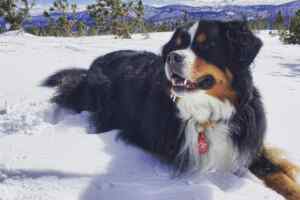
Bernese Mountain Dog Nutrition and Dietary Needs
A Bernese Mountain Dog’s nutrition and dietary needs are crucial to its overall health, lifespan, and physical well-being. Knowing what to feed your dog and how much can help prevent various diseases, obesity, and other health issues.
1. Calories: Bernese Mountain Dogs are large breeds, and therefore, they need a significant amount of calories each day. Adult Bernese Mountain Dogs typically need around 1700-2100 calories per day, while puppies require more because they are growing.
2. Protein: Bernese Mountain Dogs need a diet rich in high-quality protein to help maintain their muscle mass and support overall growth. The protein should make up approximately 18-25% of an adult Bernese Mountain Dog’s diet and about 22-32% of a pup’s diet. Good sources of protein include lean meats like chicken, beef, and fish.
3. Fats: Fats are essential for providing energy, absorbing vitamins, and supporting brain development. Healthy sources of fats include flaxseed, fish oil, and chicken fat. Fats should make up about 12-16% of an adult dog’s diet and 8-10% for puppies.
4. Carbohydrates: Carbs provide the energy your Bernese Mountain Dog needs for their daily activities. It is best to choose complex carbohydrates like sweet potatoes and brown rice rather than simple sugars.
5. Fiber: Fiber helps with digestion and can help prevent obesity by making your dog feel full. Whole grains, vegetables, and certain fruits can be excellent sources of fiber.
6. Vitamins and Minerals: Essential vitamins and minerals support various bodily functions, from bone health to the immune system. They can be found in fruits, vegetables, and specially formulated dog foods.
7. Plenty of Water: Bernese Mountain Dogs need plenty of fresh, clean water daily to keep them hydrated, especially since they have thick fur that can make them prone to overheating.
8. Special Dietary Considerations: Since Bernese Mountain Dogs are prone to certain health conditions like hip dysplasia and bloating, they might need special dietary considerations. Smaller, more frequent meals can help prevent bloating, while a diet rich in omega-3 fatty acids can support joint health.
Remember, every dog is unique, and what works for one Bernese Mountain Dog may not work for another. Always consult with your vet before making significant changes to your dog’s diet.
Bernese Mountain Dog Exercise Needs
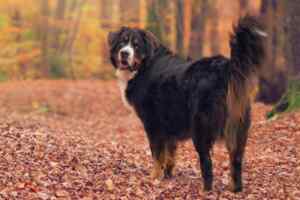
The Bernese Mountain Dog is a large and active breed that requires regular exercise to maintain their health and happiness. Their exercise needs can be broken down into the following categories:
1. Duration: These dogs should have at least 30-60 minutes of exercise per day. This could include a walk, a hike, or playtime in the backyard.
2. Intensity: While they do not require as much exercise as some other breeds, Bernese Mountain Dogs enjoy activities that challenge them both mentally and physically. They are great at tasks that involve pulling or carrying weight, thanks to their background as a working dog in the Swiss Alps.
3. Types of Exercise: These dogs enjoy a variety of exercise types. They love going on walks or hikes, and they also enjoy playing fetch or tug-of-war. Additionally, they are excellent swimmers, so swimming can be a good form of exercise, especially in the warmer months.
4. Mental Stimulation: Exercise for a Bernese Mountain Dog isn’t just about physical activity. They also need mental stimulation. This can be achieved through training sessions, puzzle toys, or tasks that require them to work or problem-solve.
5. Puppy vs Adult Exercise: Puppies have different exercise needs than adult dogs. A Bernese Mountain Dog puppy should have five minutes of exercise per month of age, up to twice a day. In contrast, an adult Bernese Mountain Dog will need more exercise.
6. Health Considerations: As the Bernese Mountain Dog is prone to certain health conditions like hip and elbow dysplasia, it’s important to provide them with low-impact exercise, especially when they are young and their bones are still developing. Regular vet check-ups are also essential to ensure they are in good health to exercise.
Remember, every dog is unique, and exercise needs can vary based on factors like age, health status, and individual personality. Always monitor your Bernese Mountain Dog during exercise to ensure they are not overexerting themselves.
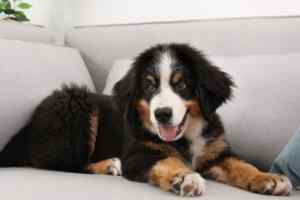
Grooming Your Bernese Mountain Dog
Grooming your Bernese Mountain Dog requires a certain degree of care and attention to keep them healthy and looking their best. Here’s how to go about it:
1. Regular Brushing: Bernese Mountain Dogs have a thick, long double coat that needs regular brushing to prevent matting and tangling. It is recommended to brush them at least once a week, although during shedding season (usually spring and fall), you may need to brush them daily. Use a slicker brush and a de-shedding tool for best results.
2. Bathing: Unlike other breeds, Bernese Mountain Dogs do not require frequent baths. In fact, overbathing can strip their coat of essential oils. Unless your dog gets particularly dirty, a bath every three to four months should suffice. Use a dog-friendly shampoo to cleanse their coat and a conditioner to keep it looking shiny and healthy.
3. Ear Cleaning: Bernese Mountain Dogs are prone to ear infections, so it’s important to clean their ears regularly. Use a vet-recommended ear cleaner and gently clean the outer part of the ear. Avoid going too deep into the ear canal as it could cause damage.
4. Nail Trimming: If you can hear your Bernese Mountain Dog’s nails clicking on the floor, it’s time for a trim. Long nails can be painful for dogs and can cause problems with walking. If you’re uncomfortable doing this yourself, consider having a professional groomer or your vet do it.
5. Teeth Cleaning: Just like humans, dogs can also suffer from gum disease and tooth decay. Brush your Bernese Mountain Dog’s teeth regularly using a dog-friendly toothpaste.
6. Paw Care: Regularly check your dog’s paws for any signs of injury or foreign objects lodged in their pads. In winter, their paws can be protected with dog boots or a wax-based paw protector to prevent damage from ice and salt.
7. Coat Trimming: While Bernese Mountain Dogs don’t need regular haircuts, their coat might need a trim to keep it neat and tidy. Pay special attention to the hair around their paws, ears, and tail.
8. Eye Cleaning: Clean around your dog’s eyes with a soft, damp cloth to remove any dirt or discharge and prevent infection. Do not use soap or shampoo near the eyes.
Remember, grooming is not only about maintaining your dog’s appearance but also their health. Regular grooming sessions will help you keep an eye on any changes in your dog’s skin or coat, which could indicate underlying health issues. Plus, grooming can be a great bonding time for you and your Bernese Mountain Dog!
Veterinary Check Up Needs in Bernese Mountain Dogs

Bernese Mountain Dogs are a large breed, known for their friendly and calm nature. However, they also have specific health concerns that need to be addressed regularly through veterinary check-ups. Here are some of the primary veterinary check-up needs for Bernese Mountain Dogs:
1. Heart Check: Like many large dog breeds, Bernese Mountain Dogs are prone to certain heart conditions. Regular vet check-ups will include a careful evaluation of your pet’s heart health to detect any signs of heart disease.
2. Hip and Elbow Dysplasia Screening: This breed is particularly susceptible to hip and elbow dysplasia, a disorder that can cause severe pain and disability. Routine veterinary examinations will often include checks for this condition, including physical examinations and X-rays if necessary.
3. Cancer Screening: Bernese Mountain Dogs have a higher risk of certain cancers compared to other dog breeds. Regular check-ups can help catch signs of cancer early, increasing the chances of successful treatment.
4. Eye Check: Bernese Mountain Dogs can suffer from a variety of eye-related issues such as progressive retinal atrophy and cataracts. Regular eye examinations are crucial to detect and treat these conditions.
5. Skin and Coat Check: This breed has a thick coat which can hide skin issues. Regular checks can help identify problems like allergies, infections, or parasites.
6. Blood Tests: Regular blood tests can help detect potential hidden health issues, such as kidney or liver disease, that may not be apparent through physical examination alone.
7. Dental Check: Like all breeds, Bernese Mountain Dogs need regular dental checks to prevent dental disease and ensure healthy teeth and gums.
8. Weight Check: Obesity can cause serious health problems for any dog, but it’s particularly problematic for large breeds like Bernese Mountain Dogs. Regular weight checks and diet consultations can help maintain a healthy weight.
9. Vaccinations: Regular vaccinations are essential to protect your Bernese Mountain Dog from dangerous diseases like distemper, parvovirus, and rabies.
10. Parasite Prevention: Regular checks for ticks, fleas, and worms are crucial, as these parasites can cause serious health issues.
Each Bernese Mountain Dog may have different health requirements. Regular veterinary check-ups help to ensure that your dog remains healthy and happy, and that any potential health concerns are addressed promptly.
Health Issues Common in Bernese Mountain Dogs

1. Hip Dysplasia: This is a common health issue in Bernese Mountain Dogs. It is a genetic condition where the dog’s hip joint doesn’t form properly, leading to arthritis or potential lameness.
2. Elbow Dysplasia: Similar to hip dysplasia, elbow dysplasia is a developmental disorder where the dog’s elbow joint doesn’t develop properly. This can also lead to lameness or arthritis.
3. Cancer: Bernese Mountain Dogs have a higher risk of cancer compared to other dog breeds. The most common types of cancer in this breed include mast cell tumors, lymphosarcoma, fibrosarcoma, and osteosarcoma.
4. Progressive Retinal Atrophy (PRA): This is a group of degenerative diseases that affect the retina. PRA can lead to blindness in Bernese Mountain Dogs.
5. Von Willebrand’s Disease: This is a blood disorder that can lead to excessive bleeding. It is caused by a deficiency in a protein needed for blood clotting.
6. Hypothyroidism: This condition occurs when the dog’s thyroid gland doesn’t produce enough thyroid hormone. Symptoms include weight gain, lack of energy, and a dull coat.
7. Gastric Torsion (Bloat): This is a life-threatening condition that can affect large, deep-chested dogs like the Bernese Mountain Dog. It occurs when the dog’s stomach twists, preventing gas from escaping.
8. Heart Conditions: Bernese Mountain Dogs are prone to a variety of heart conditions, including sub-aortic stenosis and dilated cardiomyopathy. These conditions can lead to heart failure if not treated.
9. Kidney Problems: This breed is also prone to a condition called familial nephropathy, a kidney disease that can lead to kidney failure.
10. Allergies: Bernese Mountain Dogs can suffer from a range of allergies, from food allergies to environmental allergies. Symptoms can include itching, redness, and gastrointestinal issues.
In order to mitigate these common health issues, regular veterinary check-ups, a balanced diet, and plenty of exercise are recommended for Bernese Mountain Dogs. Genetic testing is also available for some of these conditions, which can help in making breeding decisions and early detection.
Thank you for reading our Bernese Mountain dog breed online information guide. We will be adding more in-depth articles about Bernese Mountain Dogs, so be sure to bookmark this page and drop in again soon.
25. “Fun Activities to Do with Your Bernese Mountain Dog”

